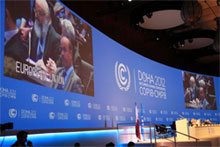By: Arnab Pratim Dutta
Date: Nov 26, 2012
Ambitions on reducing carbon emissions levels missing at CoP 18, say developing countries
 The swords and daggers are still not out. Going by previous experience of climate change conferences, the big fights are generally kept for the last week of the conference, ceremoniously also known as the high level segment. However, on the opening day of the 18th Conference of Parties (CoP18) in Doha, Qatar, parties reaffirmed their positions, on which each will try to consolidate its position over the next two weeks. Although Doha seems to be just another milestone in the setting-up process of a new treaty in 2015, based on the Durban Platform to be implemented from 2020, the coming two weeks will see confrontations, if not fisticuffs on numerous contentious issues that need to be settled before 2013. And in one of the several press conferences held on the first day, the United States, a party that has always shied away from taking on carbon emissions reduction, made this clear.
The swords and daggers are still not out. Going by previous experience of climate change conferences, the big fights are generally kept for the last week of the conference, ceremoniously also known as the high level segment. However, on the opening day of the 18th Conference of Parties (CoP18) in Doha, Qatar, parties reaffirmed their positions, on which each will try to consolidate its position over the next two weeks. Although Doha seems to be just another milestone in the setting-up process of a new treaty in 2015, based on the Durban Platform to be implemented from 2020, the coming two weeks will see confrontations, if not fisticuffs on numerous contentious issues that need to be settled before 2013. And in one of the several press conferences held on the first day, the United States, a party that has always shied away from taking on carbon emissions reduction, made this clear.
Read more...
Share this article